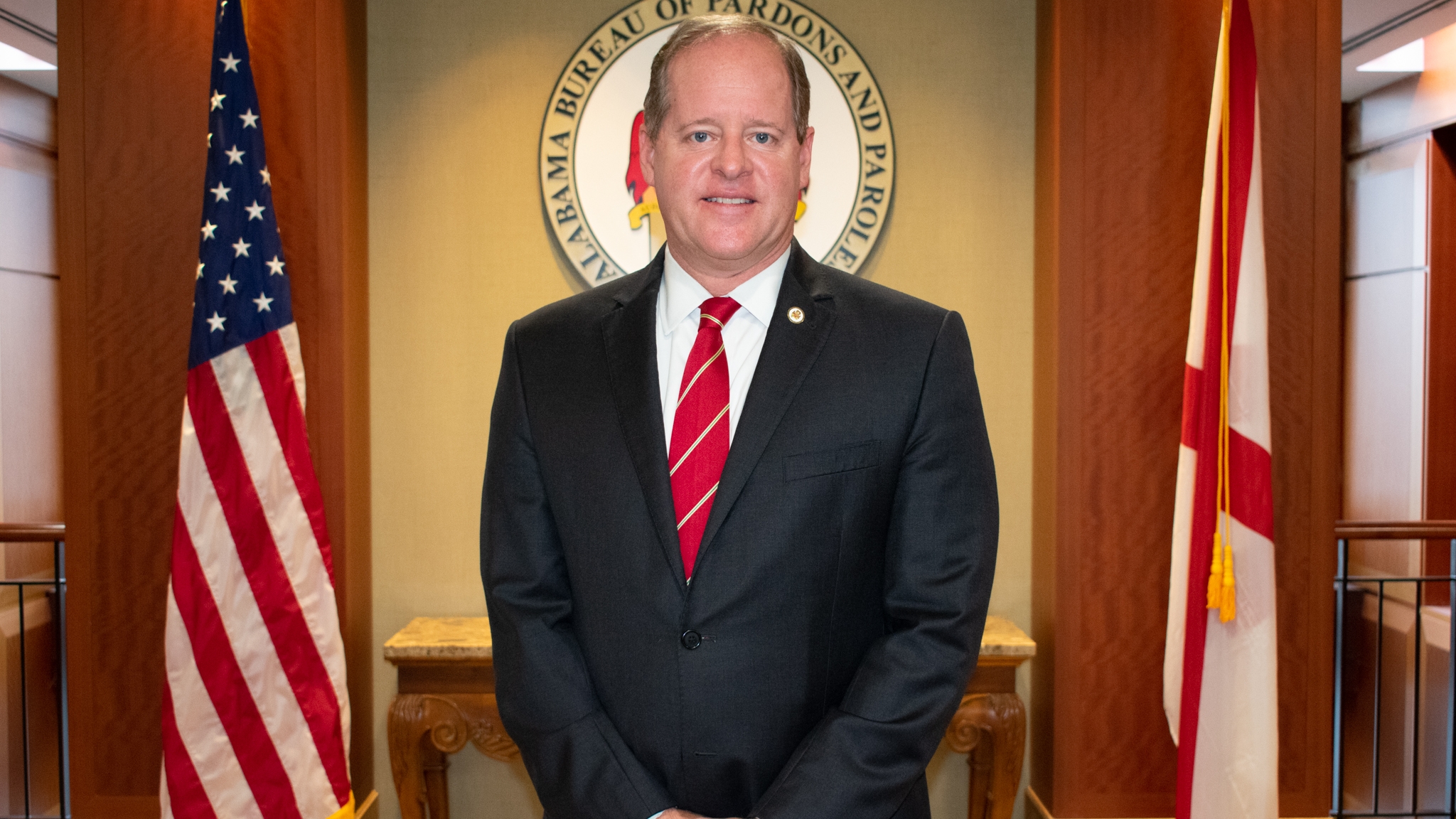|
Getting your Trinity Audio player ready...
|
Cam Ward is a former attorney, Alabama state senator, and the current director of the Alabama Bureau of Pardons and Paroles — a position he has served in since being appointed by Gov. Kay Ivey in December of 2020. As Director of Pardons and Paroles, Ward is also a member of Ivey’s cabinet.
On Wednesday, APR spoke with Ward to discuss his role as director, the challenges and successes facing the Bureau, and his future goals for pardons and paroles in Alabama.
Ward explained that his role as director is completely separate from the Board of Pardons and Paroles which is directly responsible for granting parole. As director, Ward is tasked with managing the day-to-day operations of the Bureau.
“What does that include? Well, we have 64 field offices and we have a little over 830 employees that I manage,” Ward said. “We also have 12 ‘day reporting centers’ — that’s your intense rehab facilities where they have mental health, drug treatment, and job training all around the state.”
“So, managing all of those facilities physically and the people that work in them is my first job, that’s my biggest job and it’s pretty time consuming… most of my life I only had one employee working for me, and now having 830 was a bit of a climb,” he explained.
“The day-to-day is human resources and then the second thing is coming up with how to properly supervise the people on probation and parole in Alabama,” Ward continued. “Well, people don’t realize this, even though we’re called pardons and paroles only 14 percent of our population that we supervise are parolees, actually, 81 percent are probationers, people that the judge sends to us.”
Ward noted that the Bureau oversees around 44,000 individuals that are either parolees or on probation.
“We supervise, but at the same time I’m also in charge of coming up with programs to make sure that, you know, they don’t commit crimes and go back to prison,” Ward continued. “And it depends on the population, some people due to the risk of reoffending have to wear ankle monitors, so that’s a program, but then we also have as I mentioned, the day reporting centers, including our biggest one, which is our main residential one, in Perry County.”
“What I have seen is, you graduate from there, the odds of you committing a crime again go down greatly, I mean dramatically. That’s probably one of the prouder things I’ve seen since I’ve been there… this programming is turning out to be very successful, in fact, we’ve been recognized nationally a couple times for it,” Ward said.
Ward expanded on the purpose and use of the Bureau’s day reporting centers in managing parolees and individuals on probation.
“We find people [whose] real problem in life is they had drug problems, mental health issues, or just didn’t have a high education level… if we identify you as someone who needs it, we put you through there and make sure we have the programming tools necessary for you to graduate it and make it through the program”
“So an example would be a guy who is on parole, he had a drug problem. We would put you through a pretty intensive drug treatment program, any kind of mental issues evaluated, try to get you in a skilled job,” Ward explained. “We have 15 private sector companies now that are partnered with us on job training, including Alabama Power, which we’re very proud of.”
Ward elaborated on the success he has seen at the Bureau’s rehabilitation centers during his tenure, and expressed hopes of cutting recidivism rates in half by 2030.
“Over the last two years at our Perry County PREP Center, we had 232 graduates — went through all that programming I just mentioned, plus we helped them get identification, any benefits they’re entitled to, sometimes they need to get their GED… of the 232 people, the last two years, that have gone through that program and graduated, not a single one has committed a crime,” Ward said.
Alabama was the second state in the country to sign up for Reentry 2030, a national initiative that aims to “dramatically improve reentry success for people exiting prison and those under supervision.” Ward’s specific goal for Alabama is to decrease recidivism rates in the state from 29 percent to under 15 percent by the end of the decade.
“So, if I can replicate [the Perry County] facility, or at least get close to replicating what we’re doing there, I think we can meet that goal by the end of the decade,” Ward said.
As far as the challenges he and the Bureau face, Ward highlighted misconceptions and miseducation surrounding his department and its responsibilities — specifically the distinction between the Bureau and the Board of Pardons and Paroles.
“The law was changed in 2019… I answer straight to the governor, we don’t answer at all to the board. And the board doesn’t answer to me either,” Ward explained. “My interaction [with the board] primarily is, I have a division that works for me called ‘board operations’… they provide the staffing support to the board, they staff them with whatever information they need.”
Ward explained that the board operations division puts together a docket for the board and ensures that the board receives the specific file for every person that’s on that docket. “That’s the extent of my interaction,” he said.
The Board of Pardons and Paroles has faced heavy criticism in recent years resulting from its extremely low parole rates. That issue has only been amplified by the extreme overcrowding already found in Alabama’s prison system.
“I do try to keep them informed on our reentry programming, because if it continues to be successful, it gives them more confidence that they can parole somebody through one of these reentry programs. So I think that helps increase their grant rate and maybe put some of the pressure down on the controversy,” Ward added.
“That’s one of the hardest parts of my job, actually, is that some policymakers and a lot of the general public think ‘Cam oversees who gets parole and who doesn’t, who gets a pardon and who doesn’t,'” Ward said. “And I even have lawmakers, I kid you not… some lawmakers think I oversee prisons, and I don’t oversee the prisons.”
“I have to educate people all the time that ‘no, I don’t oversee prisons, what I oversee is when you’re not in prison… you’re in the criminal justice system but you’ve either gotten out or you haven’t gone in,'” Ward went on. “That’s very hard, because I’m constantly having to play the education game.”
Despite these challenges, Ward greatly enjoys his position and takes pride in the work that the Bureau continues to every single day.
“I get asked a lot if I still like this job as opposed to previous roles and I always say it is hands down the best job I’ve ever had,” Ward said. “It’s never dull and always challenging, but actually getting to see soemone get back on their feet and make it in life is just very rewarding.”










































